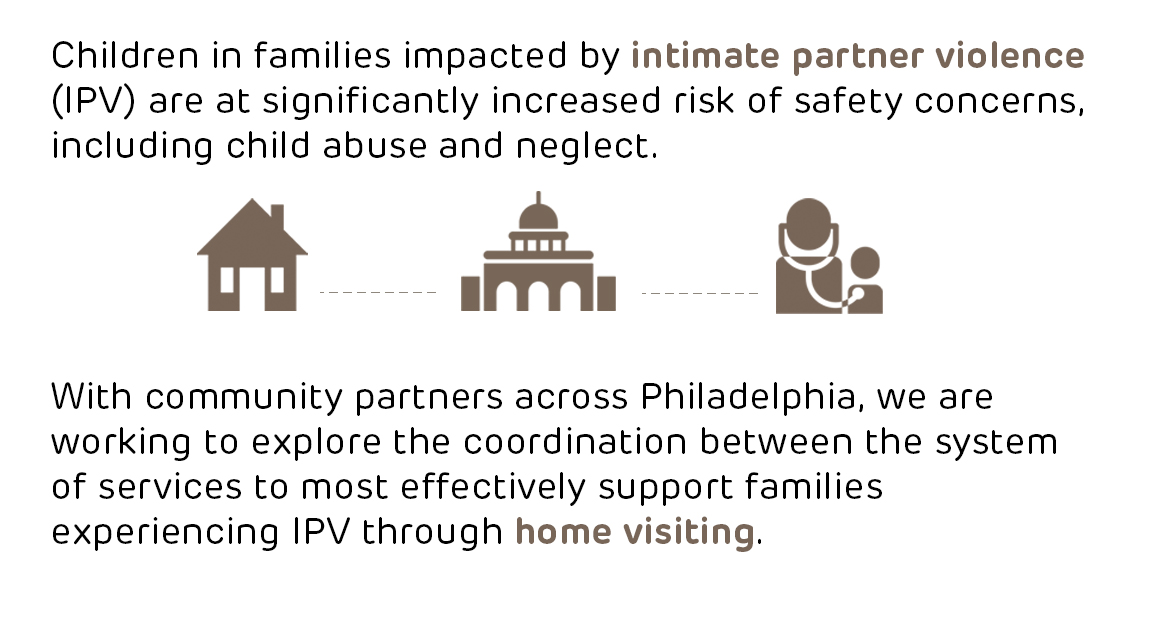Improving Outcomes for Families Experiencing Intimate Partner Violence Through Home Visiting
Statement of Problem
Within the maternal and early childhood home visiting sector, families experiencing intimate partner violence (IPV) represent a critically important subgroup. Home visited families are primarily from under-resourced neighborhoods where IPV frequently occurs alongside other challenges rooted in social and structural inequities, such as housing instability, substance use and mental health conditions.
In the national evaluation of the Maternal Infant and Early Childhood Home Visiting (MIECHV) program, nearly one-quarter of women had a recent IPV experience. In combination with building parenting and community resources, the success of home visiting relies on strong home visitor-family relationships built through weekly or biweekly home visits. Home visitors are well-positioned to address IPV and receive training on standard practices, however, the dynamics of IPV contribute to barriers in client engagement which may inhibit the foundation for a trusted home visitor-client relationship and willingness to disclose IPV. Furthermore, the evidence continuously points to IPV as a challenging area for home visitors to meaningfully address even under circumstances where robust training and clear screening protocols have been established.
Strengthening connections between home visiting and IPV agencies for a partnered response is a promising approach to delivering comprehensive and sustainable IPV services for families, yet exploration of formalized partnerships has been limited. Our multidisciplinary team, the Intimate Partner Violence-Home Visiting Collaborative (“IPV-HV Collaborative”) is taking steps to advance the field toward a greater understanding of programmatic components and contextual factors to fully support families affected by IPV.
Description
Improving Outcomes for Families Experiencing Intimate Partner Violence Through Home Visiting
Improving Outcomes for Families Experiencing Intimate Partner Violence Through Home Visiting


These research findings will be used help develop an intervention to more clearly define, integrate and strengthen the role of home visiting agencies within the greater network of local supports for families experiencing IPV.
In 2020, with support from the Vanguard Strong Start for Kids initiative and the William Penn Foundation, our team of community-academic partners that make up the IPV-HV Collaborative (including PolicyLab, Maternity Care Coalition, ParentChild+, National Nurse-Led Care Coalition, Lutheran Settlement House, Courdea, and the City of Philadelphia’s Office of Domestic Violence Strategies) came together for a research project.
This project sought to understand the existing local landscape of services for home visited families experiencing IPV and to pilot a training and consultative model between the home visiting and IPV agencies. The ultimate goals of this project are to improve outcomes for home visited families experiencing IPV by strengthening family engagement and retention, home visitor capacity to address IPV, and the referral network and interagency collaboration among the system of family-serving entities in Philadelphia.
To work towards these goals, we first used social network analysis to describe the existing service landscape for families with young children impacted by IPV and measure the connectedness that exists within this landscape. This method allowed us to understand where relationships already exist and identify opportunities for improving community connections. Survey findings from nearly 50 organizations in the Philadelphia area found great variability in the number, type and strength of existing interagency collaborations.
Additionally, qualitative findings from four focus groups with IPV and home visiting service providers gave an in-depth look at the priority issues they experience in supporting clients impacted by IPV. These sessions also produced prioritized lists of potential innovations to overcome these issues, including stronger or alternative methods of interagency collaboration.
Informed by our research findings and in response to the needs of our project partners, we co-developed and piloted a training- and capacity-building model (‘Champion Model’) wherein a group of home visitors complete an adapted version of the Pennsylvania Coalition Against Domestic Violence’s 40-hour training and engage in small-group multidisciplinary meetings following the training.
To date, the first cohort of champions completed training and attended cohort meetings to discuss opportunities for integrating learnings within and across organizations and to continue building relationships across our collective of organizations. Survey and interview data collected from champions and training facilitators during the pilot year demonstrated the early impact of the champion training and highlighted a shared commitment to use this newly developed model to create a stronger system of services for families who are impacted by IPV.
Next Steps
The IPV-HV Collaborative is now embarking on the next phase of work to fully define the Champion Model within a home visiting context and develop tools in preparation for model expansion. We collectively decided that the next training iteration will be a 25-hour training with deepened curricular components on topics most relevant for the home visiting workforce. We are excited to pilot and evaluate this revised training with a new Champion cohort in November 2024.
As we continue to build on the momentum of our cross-sector implementation efforts, we aim to:
- Train new home visitors in the champion model, convene the cross-agency cohort of champions, and collaborate to further training and technical assistance related to specific focal areas identified by the cohort of champions
- Strengthen evaluation capacity to measure impact
- Convene home visiting agencies and other community and governmental stakeholders to share lessons learned from our work, identify opportunities to scale and expand, and develop a policy agenda
This project page was last updated in October 2024.
Suggested Citation
Children's Hospital of Philadelphia, PolicyLab. Improving Outcomes for Families Experiencing Intimate Partner Violence Through Precision Home Visiting [Online]. Available at: http://www.policylab.chop.edu. [Accessed: plug in date accessed here].